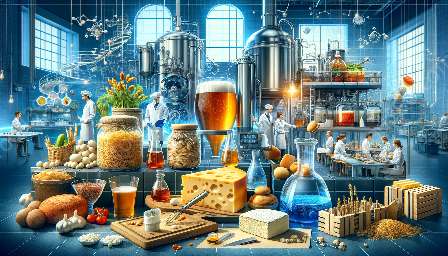Microbial fermentation is a natural process in which microorganisms, such as bacteria, yeast, and fungi, convert organic compounds into various products. This process has broad applications in fermentation science, as well as in the production of food and drink. Understanding the principles and applications of microbial fermentation is crucial in both scientific and culinary contexts.
The Science Behind Microbial Fermentation
Microbial fermentation involves the metabolic process in which microorganisms break down complex substances, such as carbohydrates, into simpler compounds, often producing energy and other byproducts in the form of gases, alcohols, and organic acids. This process occurs in the absence of oxygen (anaerobic conditions) and is vital in various biological and industrial processes.
Key players in microbial fermentation include bacteria and yeast, which are widely used in the production of fermented foods and beverages. These microorganisms utilize specific enzymes to catalyze biochemical reactions, leading to the transformation of raw materials into the desired end products.
Application of Microbial Fermentation in Food and Drink Production
Microbial fermentation plays a pivotal role in the production of a wide range of food and drink products. From artisanal cheeses and sourdough bread to alcoholic beverages and pickled vegetables, the fermentation process imparts unique flavors, textures, and preservative properties to these items.
Fermented foods are known for their distinct tastes and nutritional benefits. The fermentation of dairy, grains, fruits, and vegetables not only enhances their palatability but also increases their shelf life and nutritional value. For example, the lactic acid bacteria responsible for fermenting cabbage into sauerkraut also produce vitamins and beneficial enzymes during the process.
Similarly, the world of beverages is enriched by microbial fermentation. Yeast fermentation of sugars in grape juice results in the production of alcoholic beverages like wine, while the fermentation of malted grains gives rise to a wide spectrum of beers with diverse flavors and aromas.
The Future of Microbial Fermentation
Microbial fermentation continues to evolve in the fields of biotechnology and fermentation science. Advances in genetic engineering and bioprocessing technologies have expanded the possibilities for creating novel products through microbial fermentation, ranging from medical substances to bio-based materials.
In the realm of food and drink, the resurgence of interest in traditional and probiotic-rich fermented foods reflects a growing awareness of the health-promoting properties of these products. The potential for utilizing microbial fermentation to develop sustainable and functional foods is a subject of ongoing research and innovation.
Conclusion
Microbial fermentation is a captivating and versatile process that bridges the realms of science and gastronomy. Its profound influence on fermentation science and its integral role in the production of food and drink underscore its significance in diverse fields. By delving deeper into the intricacies of microbial fermentation, we gain valuable insights into the natural processes that shape our culinary experiences and technological advancements.

